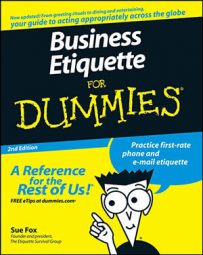A couple years ago, e-mail surpassed postal mail as the highest-volume carrier of messages. Its popularity has been booming ever since and shows no signs of stopping. Though volumes have been written about e-mail etiquette, many of the worst offenders don't seem to be reading. What can you do to keep your business e-mails proper?
Communicate clearly
The best feature of e-mail is also the worst: Communication with one or many people, across the hall or across the world, can happen immediately. That immediacy can be a tremendous asset when you need that kind of power. It can also be a real problem when you use it as a substitute for thoughtful, meaningful communication.
One problem with overusing e-mail is that your tone can easily be misunderstood. In person or on the phone, listeners can get visual or verbal cues and pick up emotions and nuances, particularly sarcasm. Even in the age of irony, and even if you use the ubiquitous smiley, readers may miss your point. "I heard Thursday's staff meeting went really well!" has a completely different meaning when it's spoken in a sarcastic tone (the meeting didn't go well at all) than it does when it's spoken in a happy, direct tone. Chances are good that your readers will misunderstand this statement in an e-mail.
Always reread your e-mail message for clarity and tone before you send it, and follow up with a phone call if you don't get a prompt response.
Write with style
Here are a few stylistic mistakes that people make when using e-mail:
- Forgetting the rules of spelling and grammar: Perhaps because of the sheer volume of e-mails that people send, e-mail tends to be a very informal medium. Informal, however, should not mean sloppy. Watch for problems such as sentence fragments and spelling errors. If you're not sure about the rules of grammar, keep a style guide handy.
- Being unprofessional: Just because you're sending an e-mail instead of a memo or telephone call doesn't mean you can let your professional standards relax. Although a touch of humor in the tone of an e-mail can be fine, make sure you preserve your professionalism. Although smileys may be helpful in social e-mails, avoid using them in business.
- Omitting a greeting and/or closing: Even worse is using "Hey" as a greeting. Is it really that hard to type "Hi Jim" or "Best wishes, Bev"?
- Using ALL CAPITALS: Capitals are harder to read than regular text. In addition, many people view their use as the e-mail equivalent of yelling, so if you wouldn't scream something in the conference room, don't type it in all capitals.
- Using all lowercase letters: This is often a sign of laziness. Make sure you capitalize proper nouns, names, and the first letter of each sentence.
- Using offensive language: Though you should watch your language at work in general, spoken expletives float away into the air. Written ones sit there on the computer screen, maybe for longer than you want them to.

